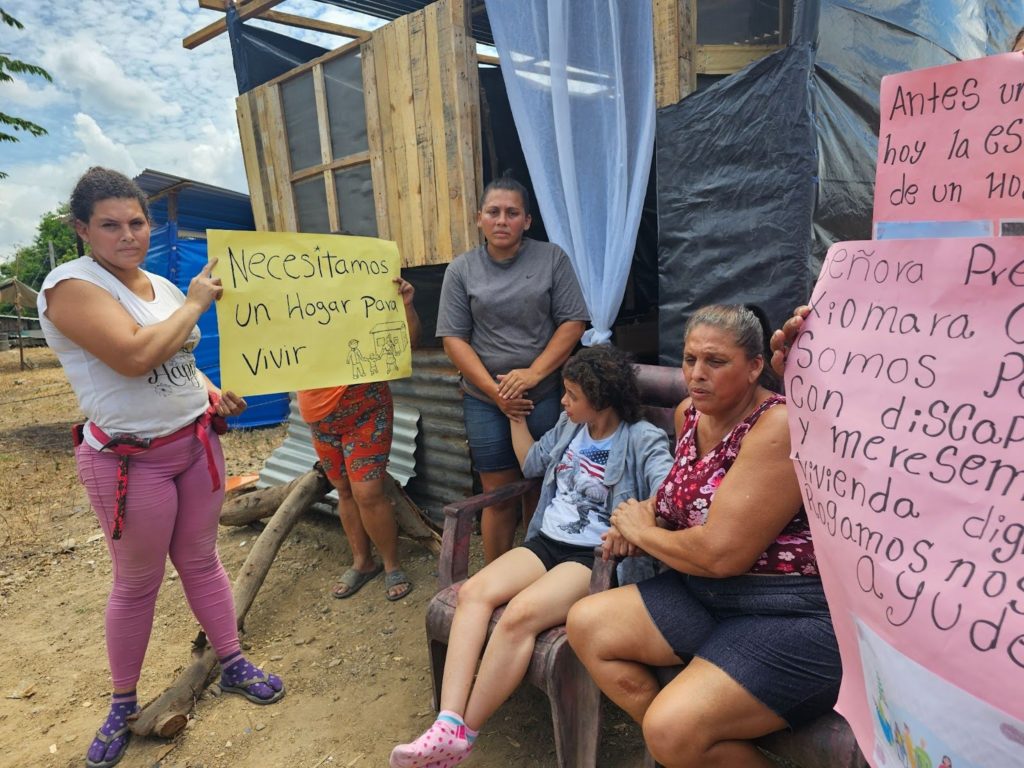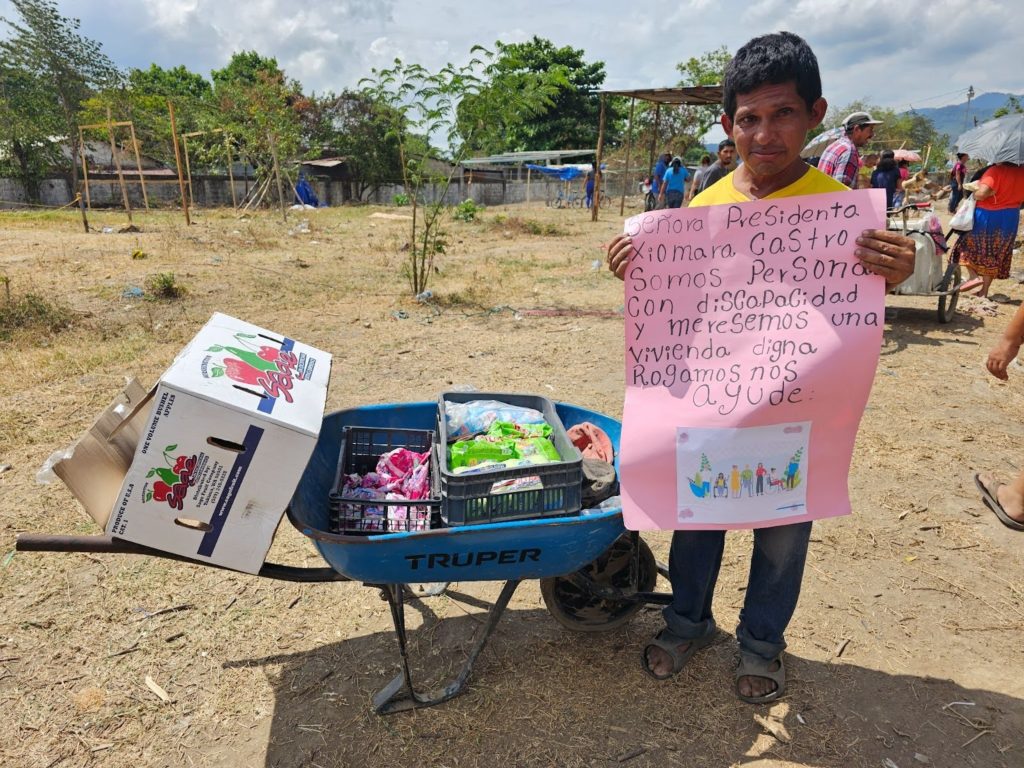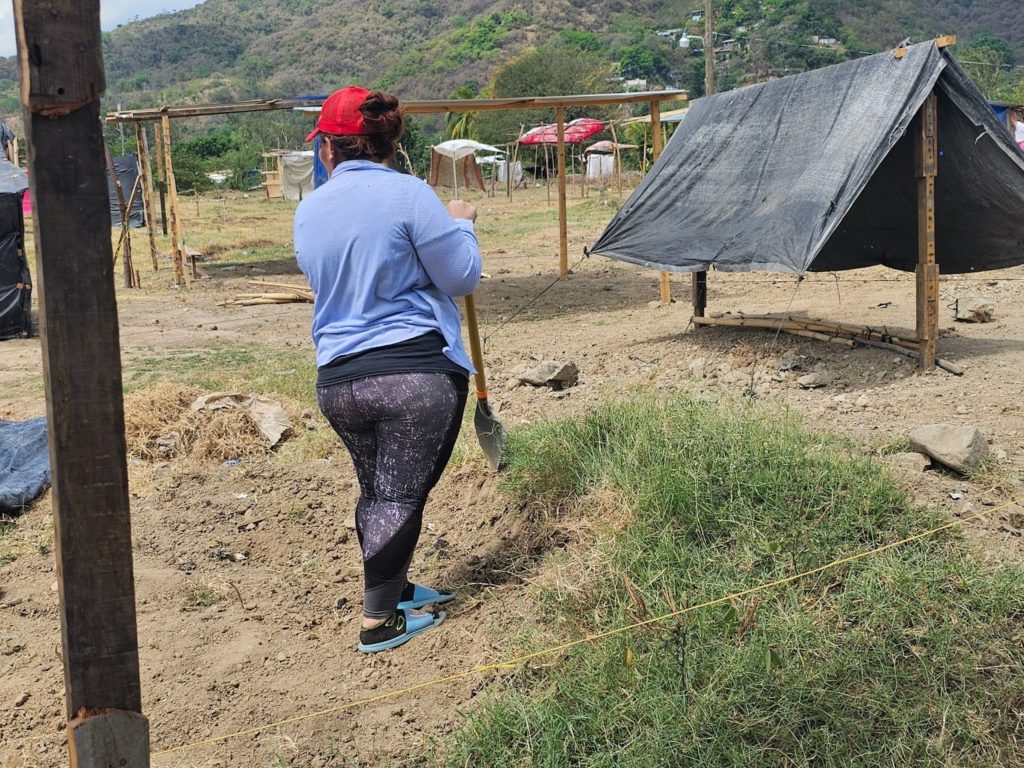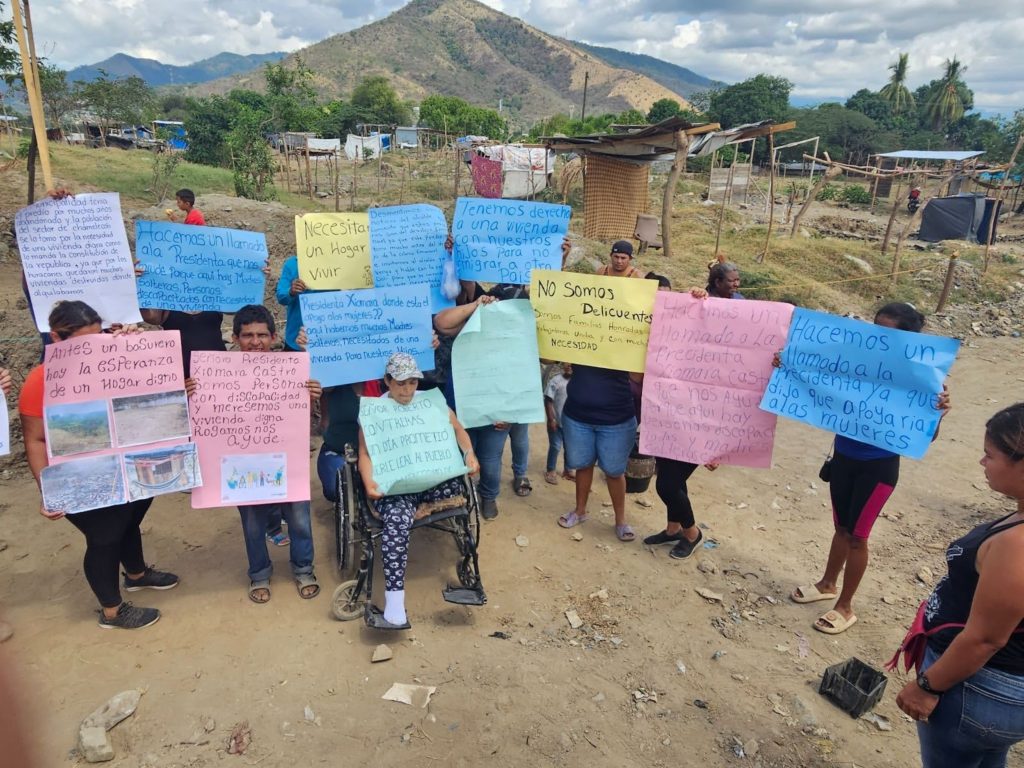Two months ago, residents from sector Chamelecón, San Pedro Sula, Honduras’ northern Cortés department, occupied a tract of land where the municipal meat processing plant (Procesadora Municipal de Carnes – Promuca) used to operate and which has been abandoned for 18 years. About 450 families have requested that the Mayor’s Office cedes the property to them and suggested naming it after the current mayor, Roberto Contreras. However, he said he would order the eviction of the families.
Text and photography: Allan Bu
Rosy Aguilar bursts into tears when she remembers she hasn’t been able to buy her own home in 30 years. She has had a tough life, making ends meet by washing clothes or doing any other kind of honest job that provides food to her family. Rosy – a single mother from sector Chamelecón in San Pedro Sula, northern Honduras – has three daughters, all of whom are adults, but one of them has a disability that has kept her on a plastic chair for 27 years. Their situation is so precarious that they cannot afford a wheelchair.
At the age of 54, Rosy feels exhausted. Her eyesight is failing, and she cannot work as hard as she used to, but the bills keep coming. She used to pay 2,000 lempiras ($80) for a small room, and her daughter has to take medication every day. “If we pay rent, we can’t afford medicine or food; it’s a dilemma,” she says.
Economic hardships have been overwhelming for Rosy and her daughters. They are one of the 450 families who occupied a municipal property adjacent to the Sabillón Cruz neighborhood in San Pedro Sula two months ago. The property, which has been abandoned for 18 years, comprises 11 plots of land where the municipal meat processing plant (Promuca) used to operate.
After the destruction caused by hurricanes Eta and Iota in 2021, the municipality of San Pedro Sula ordered all sediments piling up on the streets of Chamelecón to be deposited here. Large amounts of mud and trash ended up on this property. Small houses made of wood and nylon are put up among the rubble, including Rosy’s hut where she placed a small bed and a couple of chairs.
Rosy’s economic circumstances are similar to those of most Hondurans. This is a country where 64 percent of the population lives in poverty, per the National Statistics Institute (INE). Furthermore, economic conditions have not improved: in 2023 alone, more than 30,000 jobs were lost in Valle de Sula, according to data by Honduras’ Private Enterprise Council (Consejo Hondureño de la Empresa Privada – COHEP).

“We are single mothers and don’t have a place to go. There are children here who need help, and we are all in need of a home. I have never trespassed before; my father taught me that I should never take what doesn’t belong to me, but we don’t have a place to live,” said Rosy in tears as she held her daughter’s hand.
The family ran out of options: “That’s why we came here. But God has the final word. I ask President Xiomara Castro for help; she’s a woman, and that’s why I voted for her. As a woman, she can understand what we’re going through,” Rosy pleads.
The 450 families have been ordered by Roberto Contreras, mayor of San Pedro Sula, to vacate the municipal property. Contreras also instructed the National Police to evict them. In a statement to Honduran news outlet Televicentro, Contreras said those families occupied the property after being evicted from another neighborhood in Chamelecón.
However, Georgina, one of the residents, denies the mayor’s statements: “We all come from Chamelecón. There aren’t any former residents from other neighborhoods with us. We’ve been here for two months,” she said, and added that she lost all her possessions in the aftermath of hurricanes Eta and Iota in 2020.
Contreras told media outlets that the municipal property is uninhabitable: “The property is highly contaminated with feces and waste, which renders it unsuitable for habitation. We have reports from the Environment Ministry and the Attorney General’s Office verifying that the area is not habitable.”
He said he had given instructions to the municipality to “evict the families in order to protect their health and make way for a hospital, which will be built in the property after all contamination is disposed of.”
Families have removed waste with shovels and mattocks. Some of them have prepared plots of land to build their homes. It’s hard work, considering the large amounts of mud that were deposited here.
I find Chepito in one of the plots of land; he comes from Nueva Arcadia, department of Copán, and has been living in Chamelecón for more than 20 years. This modest man has been selling soap and detergent on the streets of his neighborhood since 2013. He had always lived alone as a tenant but has joined the families in the municipal property.

Chepito, who has trouble speaking, is beloved by his neighbors. He has never stopped working. Despite the difficulty of expressing his ideas, he sent a clear message to the mayor: “I ask Mayor Roberto Contreras to have compassion for the people. He promised he would help the Honduran people.”
Mayor of the poor
On February 12, 2022, when Roberto Contreras took office as mayor of San Pedro Sula, tamales and sodas were served at the central plaza. That day, Contreras, after taking his shoes off, announced to a noisy crowd that he’s the “mayor of the barefooted,” a term he uses to describe poor people in Honduras.
Contreras was sending a message: that he will represent the poor people of San Pedro Sula, who elected him with 61 percent of the votes. He won by a wide margin in Chamelecón and Rivera Hernández.
“We all voted for Contreras,” said one of the residents in the municipal property. Families even want to name the new neighborhood “Roberto Contreras.”
But in an interview with Televicentro, Contreras was upset by residents’ intention of naming the neighborhood after him: “How can I allow them to name it after me? I didn’t even allow a school that I built to be named after me. How can they name it Roberto Contreras after trespassing on the property? I completely disavow such actions because the Attorney General’s Office could seek legal actions against me,” he said angrily.

Wilman, one of the residents, says they wanted to name the new community after him because they see him as a leader, but if he’s upset about it, it’s because he’s distancing himself from the people who elected him. “The mayor seemed arrogant on television. He was humble when he came to the community and protested with us on the streets. He was involved with the people, but now that we need him, he turns his back on us” he said.
Wilman added that most families who are looking for a place to live are tenants and were affected by hurricanes Eta and Iota: “That’s why we are here; we haven’t been able to get ahead. The situation in the country is critical.”
The housing deficit is one of the most noticeable problems in the country. According to a 2020 study by Habitat for Humanity, Honduras’ housing deficit exceeds 1.3 million units. New homes comprised 38 percent (522,076) of the backlog, while the remaining 844,000 homes needed improvements. The study, which was carried out before hurricanes Eta and Iota, showed that 11 percent of households don’t have access to potable water and 23 percent of them have dirt floors.
For Rosy and her daughters, living on this property for over a month has lifted the burden of deciding between paying rent for a small room or buying food. There are no basic utilities here: water, electricity or a sewage system; but they don’t have to pay rent anymore. “We are not trespassers; we just need a place to live. It’s very difficult to not have a place to live, and God knows I’ve never done this before,” she said.






